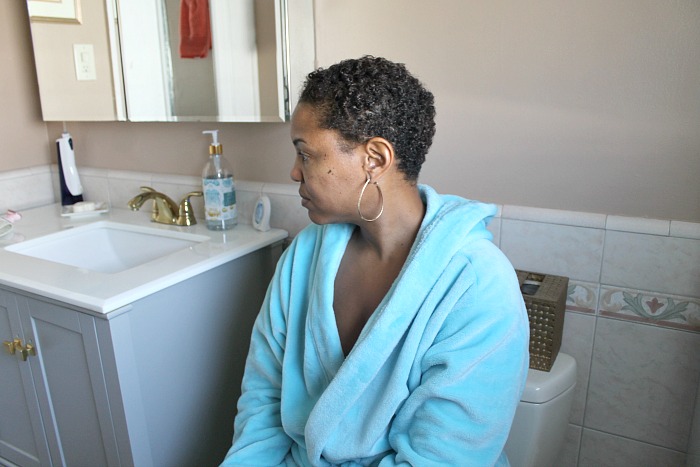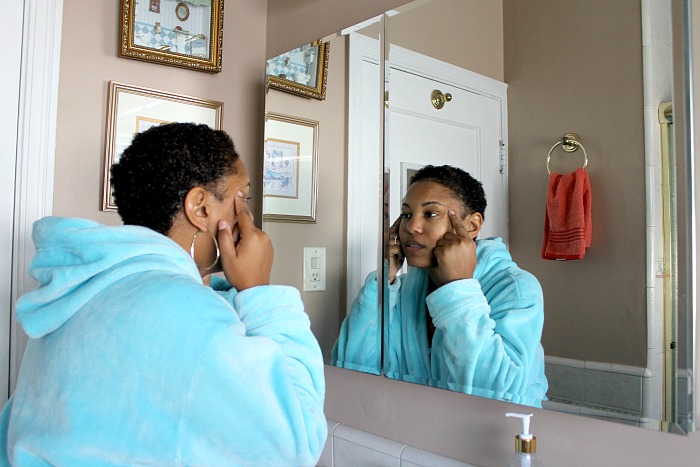This is a sponsored post. I was compensated by Med-IQ through an educational grant from Allergan to write about the realities of migraine as a neurologic disease. All opinions are my own.
“I don’t feel great.”
I’ll never forget a few years ago when I had the worse migraine episode I’d ever had. From the moment I woke up, I knew something was wrong. My head was pounding behind my eyes, and I couldn’t focus at all.
All morning, I pushed through my normal meetings (I worked from home), not wanting to cause a scene. But my temples were throbbing. And I nauseous. It was absolutely horrible.
My thing when I’m not feeling good, though, is to pretend everything is okay. I try to sound as normal as possible, using all of my energy to make sure no one knows that anything is wrong.
By 12:30, though, when it was time to take my daughter to school, I knew that I wouldn’t be able to fake it anymore. I pulled around the front of her school hoping to see a parent of one of her classmates walking in so that she could go in with them and I could get home to lay down.
Since I didn’t see anyone I could hand her off to without an explanation about how I was feeling, I double parked and walked her in myself, a sharp pain shooting across my forehead with every step. By the time I got back to the car, I knew I needed to text my husband to let him know I wouldn’t be able to pick our daughter up from school three hours later.
Ten minutes later, when I arrived home after a really rough drive, I texted him again that I was going to the hospital. Then I wrote him back to say I was going to try a shower because I didn’t think I’d be able to sit up in the chair at the hospital.
That’s all I remember until he arrived home.

Doctors told me it was normal
This wasn’t the first time I’d had a migraine. I’d suffered from them for years, occasionally having to hide in dark rooms under blankets for days at a time.
They started in my twenties. I remember going to a doctor and having him tell me that it was normal. “Women get headaches. It happens.” I was advised to drink water, take an over the counter medicine, and sleep it off.
And so that’s what I did for years until that day when my migraine got so bad that I passed out from the pain. My husband came home and found me writhing in pain on the floor of our bedroom.
It turns out I was severely dehydrated and suffering from a migraine. The migraine was exaggerated because of the dehydration. In addition to fluids, I was given pain meds intravenously, and in couple of hours, was feeling much better.
When I checked in with my primary care physician a few days later, she asked me more about my medical history. I hadn’t mentioned my headaches before because I thought it was normal. She diagnosed me with having migraines.
Migraines are often misdiagnosed
I later learned that migraines primarily affect women ages 18 – 44. That’s when it all started to make sense. Women are disproportionately affected by migraines. Because of that, it’s often minimized and not given the attention it needs as a neurological disease.
Oh yes, migraines are a neurological disease that affects 1 out of 7 Americans. Some of the symptoms of migraines include:
- Sensitivity to light (that’s why I’d find some relief in a dark room)
- Inability to function
- Nausea
All of these symptoms coupled the horrible pain behind my eyes, and I can’t believe how long I functioned without a real diagnosis.

Taking away the stigma of migraines
Migraines are not just another headache. I can only imagine how many women try to push through them so as to not seem like they’re complaining like I did. I felt weak and like I was letting people down when I was down and out because of a migraine.
That’s just not true. It’s a neurologic genetic disease that often requires prescription medication to feel better.
Sharing this truth with people and debunking the notion that a migraine is just another headache will help change the perception around it. When that happens, more people who are affected by migraines might actually get the help they need.

How to manage your migraines
Fortunately, I’ve learned how to manage migraines. I’ve learned that my triggers are my menstrual cycle, not drinking enough water, and eating too much sugar. Certain types of alcohol also exacerbate the pain, so now I know to stay away.
Med-IQ, an accredited medical education company that I’ve worked with several times has a few really great migraine management tips. They use the acronym SEEDS to make it easy:
S = Sleep hygiene–are you getting enough sleep?
E = Eat regular meals–don’t allow your blood sugar to drop too low
E = Exercise regularly
D = Keep a headache diary
S = Prioritize stress management–consider massage, acupuncture, and/or mindfulness/meditation
I love working with Med-IQ because they focus on the patient. With all of their initiatives, they’re committed to educating patients and medical professionals and helping us to communicate better diseases and treatment.
But first, trust yourself. You know your body and when something is wrong. You deserve to be healthy and to feel well.

Share your thoughts about Migraines
Med-IQ is conducting an anonymous survey and would appreciate your input. The survey will take less than 15 minutes to complete. Survey responses are shared only in aggregate. Your responses to these survey questions will provide Med-IQ with important information about your experiences with migraine and related care, which will help us develop future educational initiatives in this area.
Once you’ve completed the survey, you will have the option of providing your email address to be entered into a drawing administered by SOMA Strategies to win 1 of 10 $100 VISA gift cards. If you choose to enter, your email address will be used only to randomly draw the winners and notify them of their prize.
Click here to take the survey.
*Links to external sites are provided as a convenience and for informational purposes only. They are not intended and should not be construed as legal or medical advice, nor are they endorsements of any organization. Med-IQ bears no responsibility for the accuracy, legality, or content of any external site. Contact the external site for answers to questions regarding its content.

